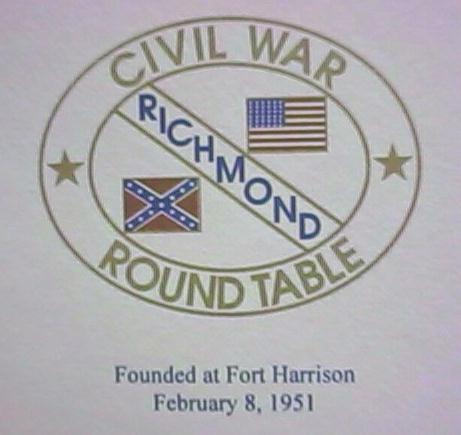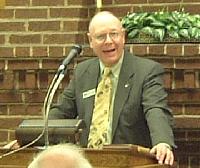


April 2003
rcwrt.org
Brag Bowling, President Rob Monroe, Editor 3019 Kensington Ave 2416 Edenbrook Dr. Richmond, VA 23221 Richmond, VA 23228-3040
April 2003 PROGRAM DeAnne Blanton "They Fought Like Demons: Women Soldiers in the American Civil War" 8:00 p.m., Tuesday, April 8, 2003, at the Boulevard United Methodist Church, 321 N. Boulevard, Richmond, VA (corner of Boulevard and Stuart Ave.) Enter the basement door on the right side under the front steps. DeAnne Blanton is a native Virginian who works as a Senior Archivist at the National Archives in Washington, D. C., specializing in 19th century Army records, particularly those of the Civil War. With Lauren Cook, she is the co-author of They Fought Like Demons: Women Soldiers in the American Civil War, published by Louisiana State University Press in 2002. Her article "Women Soldiers of the Civil War" was published in the spring 1993 issue of Prologue and earned her the 1993 Sara Jackson Award for original scholarship. Popular images of women during the American Civil War include self-sacrificing nurses, romantic spies, and brave ladies maintaining hearth and home in the absence of their men. However, that conventional picture does not tell the entire story. Hundreds of women assumed male aliases, disguised themselves in men's uniforms, and charged into battle as Union and Confederate soldiers, facing down not only the guns of the adversary but also the gender prejudices of their society. They Fought Like Demons is the first book to fully explore and explain these women, their experiences as combatants, and the controversial issues surrounding their military service. Relying on more than a decade of research in primary sources, They Fought Like Demons documents more than 250 women in uniform and find that their reasons for fighting mirrored those of men-patriotism, honor, heritage, and a desire for excitement. Some enlisted to remain with husbands or brothers, while others had dressed as men before the war. Some so enjoyed being freed from traditional women's roles that they continued their masquerade well after 1865. They Fought Like Demons describes how Yankee and Rebel women soldiers eluded detection, some for many years, and even merited promotion.
Review of the February Program
 |
Announcements
April 12 & 13 CIVIL WAR WEEKEND Pamplin Historical Park and the National Museum of the Civil War Soldier, near Petersburg. One of the finest annual Civil War events in America. Learn first hand what the Civil War soldiers' experience was like, from enlistment to battle. Watch exciting tactical demonstrations and mingle with the soldiers in camp.
April 24 BOOK SIGNING AND TALK Time:7:00 pm Location: Short Pump Barnes and Noble Frank O'Reilly, author of "The Fredericksburg Campaign: Winter War on the Rappahannock" and "Stonewall Jackson at Fredericksburg: The Battle of Prospect Hill", will speak and sign books. For additional information call 360-0103.
April 24-27 CIVIL WAR PRESERVATION TRUST -- 2003 ANNUAL CONFERENCE "Breaking the Line: The Petersburg Campaign" The CWPT will hold its annual conference at the Crowne Plaza on Canal St. in downtown Richmond. The registration fee of $475 includes tours, tour guides, coaches, conference welcome packet, name tags, etc. Hotel reservations not included. For more details see www.civilwar.org or call 888-606-1400.
April 25 "SILENT PORTRAITS": AN EVENING OF SILENT FILMS ABOUT THE CIVIL WAR Time: 6:30 pm Location: Civil War Visitor Center at Tredegar Iron Works Program includes dinner at the Tredegar Cafe followed by the showing of two films from the silent movie era in the auditorium of the Civil War Visitor Center. Reservations and fee required for dinner. Films are free. For more information contact Mike Andrus at 804 226-1981.
April 26 RICHMOND CIVIL WAR DAY AT TREDEGAR IRON WORKS- Time: 10 am to 4 pm Location: 490 Tredegar Street Learn what soldier life was like during the Civil War. Union and Confederate soldiers will perform drill, rifle firings. Also on hand will be sailors, and civilians with period music and medical demonstrations. For more information call Mike Andrus at 804-226-1981 or the Civil War Visitor Center 804-771-2145.
April 26-27 BATTLE OF FIVE FORKS REENACTMENT Battle reenactment at 5000-acre Oak Ridge Estate, Lovingston, south of Charlottesville. This event will include a battle each day, a Saturday evening dance and civilian activities. All proceeds go to historic preservation. Hosted by 7th Virginia Co. F. More information at www.7thva.com or call 410-529-1399.
Town of Chancellorsville Defeated Rezoaning Request At a March 25 meeting, the Spotsylvania County Board of Supervisors unanimously rejected a Northern Virginia developer's request to rezone about 800 acres of land that was part of the Battle of Chancellorsville. Dogwood Development Group had proposed building a number of businesses and almost 2,000 homes as part of a project to be called the Town of Chancellorsville. Following more than seven hours of board discussion and comments from citizens, the supervisors voted 6-0 to deny Dogwood's request. The decision against rezoning is viewed as a substantial victory for several preservation groups that strongly objected to the development.
Newsletter Deadlines To facilitate the printing and timely distribution of the monthly newsletter, information for it should be submitted to the editors no later than the following dates: May newsletter, April 25 June newsletter, May 23 July newsletter, June 20 August newsletter, July 25 September newsletter, August 22 October newsletter, September 26 November newsletter, October 24 December newsletter, November 21 Information may be emailed to rmonroe@richmond.com
RCWRT Monthly Speakers for 2003
Richmond Civil War Round Table Newsletter Rob Monroe, Editor 2416 Edenbrook Dr. Richmond, VA 23228-3040
Return to News Letters Index
Return to main page

©R.C.W.R.T. 2003